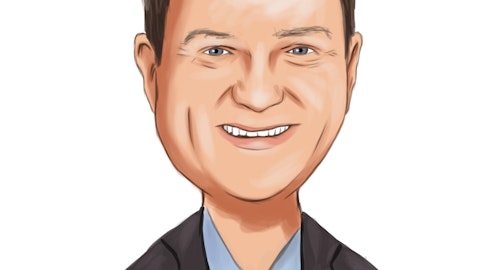Craig Siegenthaler: Got it. Thank you, Thomas. And then just for my follow-up, I heard Paul’s comments on higher legal expenses in G&A. Should we assume part of that is one-time as we work? And I’m just thinking, is there a good number for us to work off of for 1Q €˜23 relative to the $48 million in 4Q?
Paul Brody: You know, legal expenses get — they go up, they go down, cases come by, regulatory things come by. Maybe the best — the most realistic thing you could look at is on the year as opposed to on the quarter.
Craig Siegenthaler: Okay. Great guys. Thanks for taking the questions.
Operator: Thank you. Our next question comes from the line of Benjamin Budish of Barclays. Please go ahead, Benjamin.
Benjamin Budish: Hi, thanks so much for taking my questions. I kind of wanted to follow-up on the spending, but maybe kind of a higher-level question. Can you maybe talk about some of your strategic priorities for this year? I think in the past, you’ve kind of indicated the more geographic expansion, digging deeper into the hedge fund business. Where are you kind of focus in terms of spending your top priorities? Thanks.
Thomas Peterffy: Hi, thanks for the question. We are focusing on making our systems more robust. The more I-Brokers we get on the platform, some of them being large multinational banks, they require a very high level of reliability and redundancy. We have had back up data centers, online available to us for a long time, but we are not able to turn them on in a matter of seconds or minutes. So that is when significant expenditure is going to go. As far as growing the staff, we’re going to be flexible in the area of compliance and customer service, and we will respond to the increase in the number of accounts and the trading activity. As far as the technology is concerned, we will continue hiring the talent as we have in the past.
Benjamin Budish: Great. Super helpful. And then if I could follow-up on kind of a comment you guys made earlier on I know you said that the account growth, there’s kind of a mix between natural word of mouth and sales, which can be quite lumpy. I’m just wondering kind of in the most recent months, what has been the mix. Has it been sort of even or more geared one way or another? Thanks.
Thomas Peterffy: Hey, it’s half and half roughly.
Benjamin Budish: Okay, great. Thanks so much for taking my questions.
Operator: Thank you. Our next question comes from the line of Daniel Fannon of Jefferies. Your questions please, Daniel.
Daniel Fannon: Thanks. Thomas, I wanted to get your thoughts on just the elevated use of options, as well as futures and maybe the sustainability of that as you think about 2023 and whether we’re above average, below or you think we can still grow from here?
Thomas Peterffy: So as I started my career in this business in an options trader on the floor of (ph). And all I have seen over the past 46 years is a continuous increase in options trading. And what we see now is in addition to the U.S. growth, growth is now beginning to pick up in Asia and in Europe in the auction space, because they basically go into the options business about 20 or 30 years ago and then it’s slowly dwindled down to nothing over there. And now is finally picking up again. So I am extremely optimistic about the growth in options trading. Obviously, if you just look at the idea of doing vertical spreads, when your losses are very limited, and you can have some very thing positive, you can put on some terrific positions in vertical spreads, it’s much better than trading stocks.
Daniel Fannon: Great. Thank you.
Operator: Thank you. Our next question comes from the line of Kyle Voigt of KBW. Pleas go ahead, Kyle.
Kyle Voigt: Hey, good evening. Maybe just a follow-up on the commentary earlier regarding the sales effort adding 10% to 20% to account growth per year, I’m just wondering is that with the current sales team and marketing budget and when we think about that 15% expense growth in sales and marketing and area you’re prioritizing. I’m just wondering like, like bigger picture, are there larger changes in advertising strategy that you’re contemplating? I guess, as you look out to next year or is it?
Thomas Peterffy: So we’re working this across the board. We’re continuously trying to train new salespeople, who are basically come to begin working on our professional help desk. And after they went to that for about two or three years, they are mature enough to bring into the sales team and begin to sell. As far as advertising, as you know, it’s the digital advertising world is very up in it’s a situation that — it’s — so I’m sorry — I — it is the digital advertising space is in flux to the extended, I mean in a flux, trying to talk about it. And so I €“ basically, what I’m saying is reflecting what’s going on there and the way I say it. So we’re continuously working on it, and we are — we do not have budget constraints anywhere, but we are trying to get a good return on investment.
So we are not going to throw a lot of money on various campaigns unless we see that it proves itself. So we try small and if it works, we keep trying to get it bigger and bigger and bigger. But usually, as we find it when we start something, it starts working. And as we keep growing, it works less and less. I don’t know why that is so, but that’s how it is. So we have a lot more, we would love to spend a lot more money advertising, but we won’t do it without having a reasonable we track.
Kyle Voigt: Understood. Maybe I shift over to NII. Just curious, strategically speaking, if we start to see the central banks cut overnight rates potentially by later this year, does that change your strategy on the duration of the segregated cash portfolio at all?





